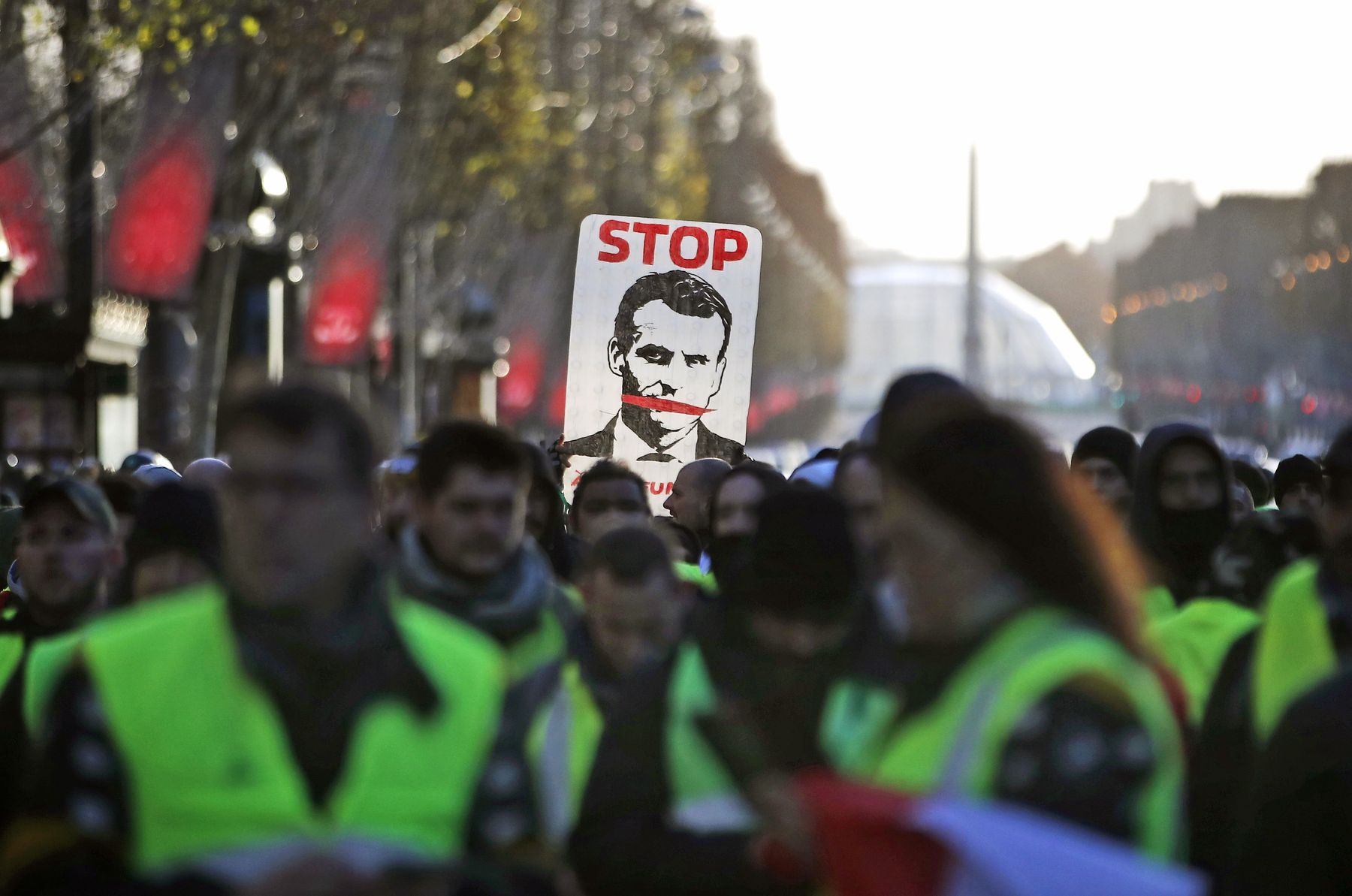"Popular classes are not condemned to demobilization"
- The sociologist Aldo Rubert is making a thesis about the movement of Jaka Amarillo in France: he is interested in understanding the heterogeneous politicization of the popular classes, because the relationship of citizens with politics cannot be reduced to what happens – or does not happen – in the electoral period.

Gizarte Antropologia ikasi zuen Bartzelonako Unibertsitatean, eta Gizarte Zientzietako masterra, ondoren, ENS/EHESS eskolan (Paris). Lanaren soziologia, klase popularrak eta mugimendu sozialak aztertzen ditu. Ikerketa etnografiko bat egin zuen, rider-ek lanarekiko eta politikarekiko duten harremana aztertuz; gaur egun, berriz, Jaka Horien mugimenduari eta horren eragin biografikoari buruzko doktoretza-tesia egiten ari da.
Before the first Jaka Horiek demonstration on November 17, 2018, what was the context?Six months before the first Jaka Amarillo ceremony, a girl of Martian origin launched on the
internet a request against the rise in fuel prices, the ecotax. By October 2018, the request collected millions of signatures. It was a great success, and at the same time they began organizing calls via Facebook, calling for the mobilization on November 17.
What memories do you have of that day?I only spent a
few hours in the mobilization, because at that time I was doing another ethnography with some Paris riders. The first exercise was a bit quiet, compared to what we'll see later. In Paris, for example, they cut off the road around the city.
From that moment on, the mobilizations are organized every Saturday. What are the demands of the movement?
First of all, the disappearance of the fuel tax, which is particularly harmful to the rural people and urban outskirts, who need a lot of cars. But it also calls for the recovery of the solidarity tax on the great fortunes, the extension of public services, especially in rural areas and on the outskirts of cities, and the promotion of participatory and equitable democracy.
In short, the representative crisis in France is evident and, in turn, the rare cited in the public debate, the popular France which is suffering, is evident. Poverty is manifested, it is evident that there are people who cannot live with dignity with their wages and who have to do theirs and both to reach the end of the month.
.jpg)
"50% of the
Jaka Amarillo movement are women, which is interesting and surprising, as most social movements led by parties, unions and others
have been very masculine."
What reactions then arose?
The theme filled the French prime time. At first it worked with a lot of sensationalism, because it was thought to be a harmless movement: the poor who don't reach the end of the month. But when the force of the movement emerged, they were treated with great class contempt. This attitude came beforehand, because Macron himself made a huge class contempt, not only through his social policies, but through his very painful statements. In the memory of the people I've interviewed, Macron has been someone who has humbled them.
And how did the left react?
Inside the parties there were dissonant people, but a large part of the left showed great mistrust at the movement: The relationship with Marine Le Pen or the employer was too fast, due to the large number of independent workers. It is true that the demands were rather minimalist, but the truth is that the movement of Jaka Them has not been born of revolutionary organizations. However, revolutionary organizations would rather have these profiles within themselves.
As we know, the struggles, the parties and the unions are plagued by middle classes in the public sector, far from the profile they say they represent. I therefore find it surprising that the Left has shown some mistrust, because, after all, what do we want the Left to be present only in the demonstrations of teachers, students and workers in the public sector, that is, in the demands for professions that are more or less protected and of great cultural capital? In this case, the Left is condemned to be a minority.
In addition to the usual demonstrations, the blocking of roads and the occupation of roundabouts has been one of the characteristics of the movement. In his thesis he studied exactly the occupation of two roundabouts.
I was already working with people living in the Paris region, but I was interested in seeing the roundabouts, which are very representative of the transformation of the neoliberal economy, which demonstrate very well how the popular environments have changed. At first they took me with suspicion, but after the relationship they invited me to their headquarters, and so I saw a fundamental aspect of the movement.
What was the day to day like in the glories?
Roundabout is not just an area of militancy: on the roundabout you meet people, you laugh, you fall in love, you make life. In rural areas, the disappearance of large population axes such as the church, bars, associations, etc. stands out. Thanks to the roundabouts, people met, talked about their living conditions and organized collective demands in situations of precariousness or injustice that they had lived in solitude or shame.
Given what you've seen and what you've been told, has anything paid special attention to you?I've found mostly two
types of groups. On the one hand, there is a large and surprising percentage of the first popular class protesters, that is, people who have never manifested themselves in their lives, who decide to go out in the street with the Jaka Amarillo movement. That's very powerful.
Then, within the middle classes that have been mobilized, many people already knew the collective action, especially the manifestation of the left, but felt a great disenchantment regarding the evolution of social struggles in France, and thanks to Jaka Those have been reactivated.
What conclusions do you draw?
The most important thing is: The Jaka movement These have questioned the demobilization of the popular classes, questioned the fact that the popular classes are condemned to abstain, to no matter the politics or to vote on the far right, and questioned the fascialization of the popular classes.
If we look at participation in the movement based on race and gender, what can we see?In rural areas, the representation of racial minority categories
is quite proportional to the people living in them. On the contrary, mobilisation has been relative – although some have supported the movement, as several studies show – in the municipalities on the periphery of Paris, where there is a lot of racialised population, and it is true that these people have not mobilised so much. It doesn't mean they're not there, but you haven't seen so many people from those suburbs.
What are the hypotheses for explaining these data?
Some researchers affirm that these classes have even more difficulties to mobilize than the white folk classes. Some studies show that, in the Banlieues, the Police are very violently in charge of militant action, which has a great deterrent effect. As racist people, he is much more afraid than a white person that the police will keep you in a demonstration.
On the other hand, these populations show much less confidence in the chances of collective action, especially after the 2005 mobilizations, when they felt that no one supported them.
And in the case of women, what is their presence in the Jaka Horiek movement?50% of the Jaka
Ellas movement are women, something interesting and surprising, as most social movements led by parties, unions and others have been very masculine.
It's a high percentage, yes.
What do you think it reflects? One of the hypotheses used to explain this outstanding presence is that not only women constitute an
important part of the most precarious and proletarian work of social reproduction services, but also women are the ones who most see the issue of purchasing power, an aspect that has been the most structured demand of the Jaka Horiek movement. When I interviewed women, I asked them about their financial difficulties, and they know exactly what the money is spent on, as well as the last penny.
Women are responsible for the domestic economy.
That's it. Various studies show that, as far as our generalised societies are concerned, in the most popular sectors of the social ladder, women manage the family budget, complete the administrative documents and, in general, they are responsible for household finances. On the contrary, as the social hierarchy grows, when there's more money, men worry about it, and let's not say when we talk about fiscal optimization.
.jpg)
"For Macron, Jaka Amarillo has stood by the sword of Damocles. It now develops some policies much more carefully”
If I'm not mistaken, you're also interested in the biographical trajectory of the people that I interview. Have you been particularly surprised at something in the case of female militants? Some
of the social characteristics of these women seem very striking to me, because they show a kind of popular female virility, and now I'm trying to work it out. I mean, I've met a lot of women who don't feel identified by relating to hegemonic femininity, dependence. Without militant discourse, they explain that they have always been “marimutiles”; that in childhood they did not want to dress, because they could not run, that when they were teenagers they did not want to be raised by their siblings, nor obey their father, and that they left home for that reason… All of this highlights the existence of profiles of critical women in popular contexts, even if they do not use the feminist label.
We also see the importance of not limiting oneself to the dimension of discourse. Ethnography allows us to access this extensive record of practices that shows the difference between words and actions and between gender norms and women's expectations.
What is the heritage of Jaka Them?It is clear
that the movement has declined in terms of the number of participants, although it is still present in all social conflicts, and it is clear that they continue to condition politics. This is noted in the parties ' programmes. And as for Macron, let's not say, for him Jaka Amarillo has been like the sword of Damocles. It now develops a number of policies much more carefully and, above all, does not dare to say anything.
Apart from that, thanks to the research I have seen that the struggle has lasted, although this extension has gone unnoticed.
Any examples of the latter? Some
groups have been organized into lists of citizens and presented for local and municipal elections. They have not had spectacular results, but it has become clear that Jaka Amarillo is not against the system of representation and has wanted to organize itself politically in some ways, even in some cases they have created permanent partnerships.
And then, above all, they have formed solidarity brigades, which through self-organization distribute surplus fruit or vegetable to the most vulnerable groups, many of them Jaca Rubia, but also other groups. It is an extremely interesting project, as they try to avoid the appearance of vertical logics and, on the contrary, to build logics of reciprocity.
Would you like to talk about something else? There
is one interesting thing that we have not mentioned so far: the ecological issue. Beyond the speeches, Jaka Horiek and the popular classes have frequently shown a special type of ecologism: it is not the eco-moral citizen of the virtuous consumption of the upper classes, the purchase of bio and bicycle, but what the Catalan anthropologist and economist Joan Martínez Alier calls the environmentalism of the poor.
The environmentalism of the popular classes will not be expressed by official coordinates, but it will actually reduce emissions, as consumption is lower and self-consumption and exchange practices are used. Just look at the data: it is clear that the lifestyle of the upper classes has a much greater impact on the environment, although it is much more obvious and easier to point out to the working people, because they are walking a lot in the car or do not recycle.
Once again, there is a difference between what is done and what is done dice.En the ecological issue, and the same is true of the feminist, class or left-right axis issue, it has become clear that there are practices that can be
considered progressive, feminist or ecologist, but that do not work according to the coordinates that militants wanted or how we are accustomed to. In other words, the way in which ecological values are materialized will not necessarily be the purchase of organic apples.
Herria eliteen aurka. Edo beharbada errealitate konplexuagoa, historiaren barrunbeetan sartzen zarenean. Horrela islatzen dute Éric Vuillarden liburuek. 2017an Frantziako letren saririk handiena, Goncourt saria jaso zuen L’Ordre du jour liburuarengatik.
The movement of the Yellow Vests, as soon as it was lifted, was condemned to shut down. There it goes. It seemed that I would get nothing. Because he rebelled against a simple tribute? Or because it didn't pose a serious redistribution of rewards and riches? Now the discourse is... [+]























